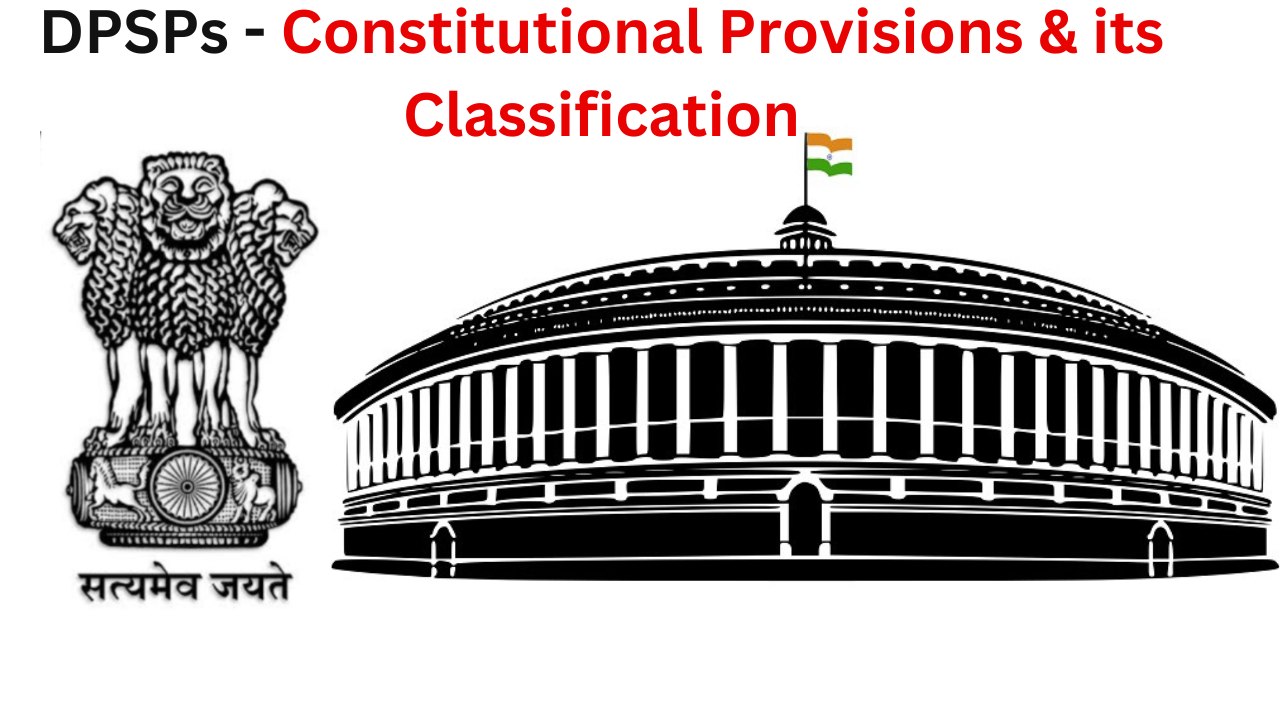Understanding DPSPs – Constitutional Provisions & its Classification is vital for students preparing for upcoming government exams. DPSPs are fundamental principles of governance enshrined in the Indian Constitution, reflecting the social, economic, and political aspirations of the nation. Mastery of this topic equips students with insights into the state’s role in promoting welfare and justice. Moreover, familiarity with the classification of DPSPs enables students to analyze their significance in policy formulation and implementation, enhancing their comprehension of constitutional principles and governance mechanisms, thereby aiding in exam preparation.

Also Read – 30 Major Amendments of Indian Constitution
Also Read – Rajya Sabha
DPSPs – Constitutional Provisions & its Classification
- Part IV of the Constitution, from Articles 36 to 51, enumerates the Directive Principles of State Policy.
- Directive Principles of State Policy are not formally classified under our Constitution.
- For better understanding and based on content and direction, DPSP can be classified into three categories, namely:
- Socialistic Principles
- Liberal-Intellectual Principles
- Gandhian Principles
Socialistic Principles
- These principles explore the school of socialism and lay down the structure of a democratic socialist state.
- These are the principles with the aim and goal to provide socio-economic justice in society and to set the path towards the welfare state.
- The basic aim is to minimize inequalities in income, status, facilities & opportunities (Article 38)
- They direct the state through various Articles some of them being, Article 39 A- Promote equal Justice and free legal aid to the poor.
- Article 42- Make provision for just and humane conditions of work and maternity relief.
- Article 47- Raise the level of nutrition and the standard of living of people and to improve public health; along with numerous other articles such as Article 38, Article 39, Article 41, Article 43, and Article 43A.
Liberal-Intellectual Principles
- These principles reflect the ideology of liberalism.
- Under various articles, they direct the state to achieve various ideals as seen in Article 44- Secure for all citizens a uniform civil code throughout the country.
- Article 45- Provide early childhood care and education for all children until they complete the age of six years.
- Article 48- Organise agriculture and animal husbandry on modern and scientific lines, Article 48A, Article 49, Article 50, and Article 51.
Gandhian Principles
- Based on Gandhian ideology these principles represent the program of reconstruction enunciated by Mahatma Gandhi during the national movement.
- To fulfil the dreams of Mahatma Gandhi, some of his ideas were included in Directive Principles of State Policy, and they direct the State through Articles such as Article 43- Promote cottage industries on an individual or corporate basis in rural areas.
- Article 47- Prohibit the consumption of intoxicating drinks and drugs which are injurious to health.
- Article 48- Prohibit the slaughter of cows, calves, and other milch and draught cattle and to improve their breeds; Article 40, Article 43B, and Article 46.
Directives Outside Part IV
Apart from the Directives included in Part IV, there are some other Directives contained in other parts of the Constitution. They are:
- Claims of SCs and STs to Services: The claims of the members of the Scheduled Castes and the Scheduled Tribes shall be taken into consideration, consistently with the maintenance of efficiency of administration, in the making of appointments to services and posts in connection with the affairs of the Union or a State (Article 335 in Part XVI).
- Instruction in mother tongue: It shall be the endeavour of every state and every local authority within the state to provide adequate facilities for instruction in the mother tongue at the primary stage of education to children belonging to linguistic minority groups (Article 350-A in Part XVII).
- Development of the Hindi Language: It shall be the duty of the Union to promote the spread of the Hindi language and to develop it so that it may serve as a medium of expression for all the elements of the composite culture of India (Article 351 in Part XVII).
NOTE:
The above Directives are also non-justiciable in nature. However, they are also given equal importance and attention by the judiciary on the ground that all parts of the constitution must be read together.
